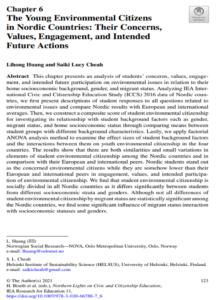The Young Environmental Citizens in Nordic Countries: Their Concerns, Values, Engagement, and Intended Future Actions
Huang, L., & Cheah, S. L. (2021). The Young Environmental Citizens in Nordic Countries: Their Concerns, Values, Engagement, and Intended Future Actions. Northern Lights on Civic and Citizenship Education: A Cross-national Comparison of Nordic Data from ICCS, 123-146.

Abstract
This chapter presents an analysis of students’ concerns, values, engagement, and intended future participation on environmental issues in relation to their home socioeconomic background, gender, and migrant status. Analyzing IEA International Civic and Citizenship Education Study (ICCS) 2016 data of Nordic countries, we first present descriptions of student responses to all questions related to environmental issues and compare Nordic results with European and international averages. Then, we construct a composite score of student environmental citizenship for investigating its relationship with student background factors such as gender, migrant status, and home socioeconomic status through comparing means between student groups with different background characteristics. Lastly, we apply factorial ANOVA analysis method to examine the effect sizes of student background factors and the interactions between them on youth environmental citizenship in the four countries. The results show that there are both similarities and small variations in elements of student environmental citizenship among the Nordic countries and in comparison with their European and international peers. Nordic students stand out as the concerned environmental citizens while they are somehow lower than their European and international peers in engagement, values, and intended participation of environmental citizenship. We find that student environmental citizenship is socially divided in all Nordic countries as it differs significantly between students from different socioeconomic strata and genders. Although not all differences of student environmental citizenship by migrant status are statistically significant among the Nordic countries, we find some significant influence of migrant status interaction with socioeconomic statuses and genders.
